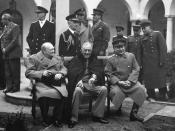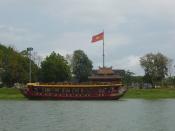Account for the US Involvement in Vietnam up to the Geneva Accord of 1954?
Even before the US entered World War II American leaders had been making plans for the creation of a peaceful and prosperous world order after hostilities ceased based on a "liberal capitalist system based upon the equal principle of commercial opportunity."# The American policy leaders were haunted by the great depression and feared that when demand for military hardware at the end of the war declined the twin problems of overproduction and unemployment would haunt them again. They chose overseas commercial expansion as the best solution to preserve capitalism in the United States.
These architects of new world order, for example Adolf Berle and Leo Pasvolsky, concluded that continuation of colonial monopolies would not only undermine American economic interests but that imperial preferences "might even provoke dynamic 'have not nations' into taking aggressive actions that might culminate in World War III."# Of particular concern was the imperial policies of the French, British and Dutch in the Far East which they feared would give rise to a strong colonial movement which would threaten the economic interests of the US and world stability. It was for this reason that Roosevelt first became interested in Indochina.
In the interval between the fall of France in 1940 and the Pearl Harbour attack in December 1941 Roosevelt and his advisors watched with increasing apprehension the influx of military power into Indochina, a French colony. The US urged the French to refuse Japanese requests for authorisation to use bases there but was "reluctant to consider the use of military force in the Far East at this particular time."#
Between August 9th-13th 1941 Roosevelt met Churchill aboard the Prince of Wales at Placenta Bay to discuss what would happen to colonies post-war.


